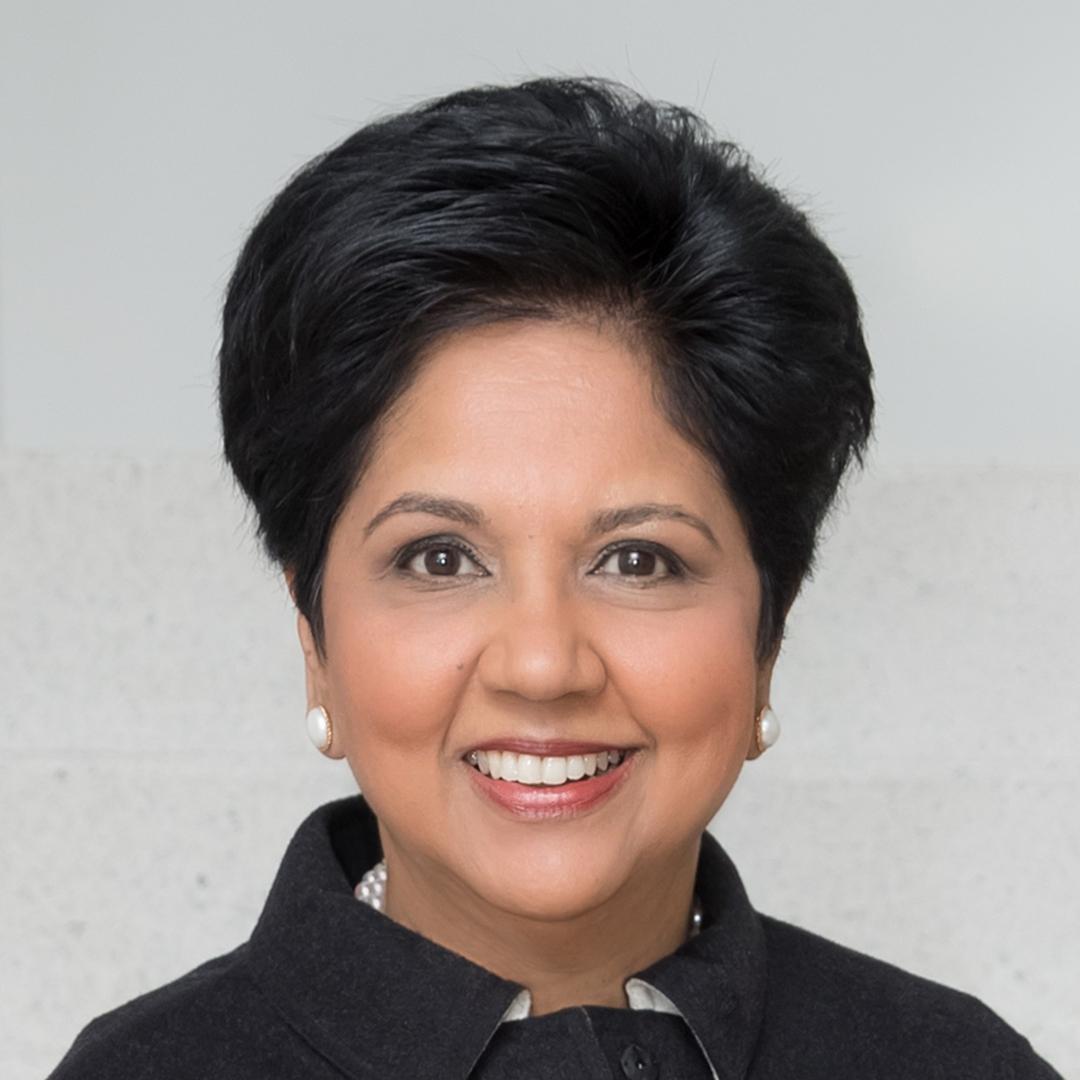
For the past 12 years, Indra Nooyi has called the shots as chairman and CEO of PepsiCo—one of the most recognized brands in the world. Nooyi stepped down from the company in early 2019, but during her tenure, sales increased by 80% and PepsiCo’s philanthropic and community initiatives expanded, leaving the company vastly more successful than when she joined.
Since its inception in 1965, PepsiCo has prided itself in its ability to evolve as tastes, trends, and lifestyles change across more than 200 countries and territories. Although she grew up in a conservative South Indian family in Madras, India, Nooyi embodies the same instinct for innovation. From a young age, Nooyi was a powerhouse. She climbed trees, played cricket, and rocked out on her guitar in local halls as her parents watched from the front row.
Nooyi was not a typical Madras woman: at the time, women were discouraged from taking active roles in sports, entertainment, and business. Respecting your elders, studying hard to get good grades, and marrying at age 18 were widely thought to be women’s main duties. Hard work and courteousness came naturally, but the expectation to do without professional success was tougher to swallow. Inspired by her older sister, who was the first to leave home for college, Nooyi fought for a spot at Madras Christian College, one of India’s highly competitive schools. Her acceptance—one of five women admitted to a science program—was an exceptional achievement.
The business management bug bit Nooyi partway through her undergraduate program and, after completing her first master’s degree at the Indian Institute of Management in Calcutta, Nooyi accepted a position at Johnson & Johnson in India. She was responsible for launching a new line of feminine hygiene products—which could not be advertised or even sold in public. The campaign was a hard-fought success and, in many ways, prepared Nooyi for obstacles she would face when she moved to the United States in 1978 to pursue a second master’s degree at Yale.
Coming to the U.S. was tougher financially than Nooyi had expected. She took part-time jobs and worked night shifts to earn just 50 cents more per hour, but was unable to afford a decent suit for job interviews. Desperate, Nooyi purchased an ill-fitting outfit and, though the pants were too short and the jacket several sizes too big, she wore it to her first major interview. The experience was mortifying but serendipitous: An employee in career development saw her leaving the interview in tears and asked what Nooyi normally wore to interviews in India. The conversation gave Nooyi the confidence she needed. In the future, she would wear a sari to interviews at high-powered U.S. firms. If a company did not want to hire her based on who she was, she thought, they did not deserve her.
Nooyi’s tenacity and talent caught the eye of both General Electric and PepsiCo and soon the two were vying to take her on board. Joining PepsiCo in 1994 was an incredible achievement—at the time no foreign-born person or woman was on the executive floor—but came with a slew of fresh challenges. Many colleagues questioned why Nooyi had been hired to a senior level position given what they perceived to be her limited experience. Some felt she was too outspoken, challenging division presidents too often. But Nooyi wasn’t concerned: She was hired to do a job and was singularly focused on doing it better than anybody else.
With visionary foresight, Nooyi prepared the company for a changing consumer base—one that was seeking healthier products and lifestyles. Discussion about rising rates of obesity and the risks of sedentary lifestyles were becoming more commonplace. It was stylish to “go organic” and purchase natural products. Nooyi recognized the need to build PepsiCo’s portfolio around good-for-you products.
Nooyi was the motivating force behind the divesture of PepsiCo’s fast food brands. She transformed the snacks, beverages, and restaurant divisions, which included KFC, Taco Bell, Pizza Hut, and California Pizza Kitchen, by orchestrating the acquisition of popular brands like Tropicana, Quaker Oats, Gatorade, and Naked. Wanting to give consumers a whole range of products, Nooyi’s updated portfolio included “fun” (less healthy) and “better-for-you” (more healthy) products that were widely available and priced affordably.
Since taking the top spot at PepsiCo, Nooyi has been consistently ranked as one of the most powerful and effective women in business. In addition to launching new product lines, she has helped transform the company’s corporate culture—the business provides a wide variety of products at different price points to expand the consumer base, and increasingly focuses on environmental sustainability and work/life balance for employees. PepsiCo has worked toward empowering women and minorities by hiring diverse personnel to senior level positions. The company now offers on-site services, such as daycare, to support employees with families.
PepsiCo has always been a company with a soul, Nooyi says, but it has now come out in a phenomenal way. Nooyi helped lead the PepsiCo Foundation’s efforts to address issues of global concern, like racial and gender equality. In their largest grant to date in the New York City area, the PepsiCo Foundation committed $4 million to the Robin Hood Foundation to confront poverty among young women living in the Bronx, the city’s poorest borough. The gift is expected to serve 20,000 young women by funding education and job training.
Nooyi’s legacy will live on well past her departure. PepsiCo aims to invest $100 million in initiatives to support 12.5 million women and girls worldwide in their pursuit of higher education and workforce readiness by 2025. The next generation of women leaders will be well prepared due to Nooyi’s seemingly superhuman influence.
Information as of March 2019

